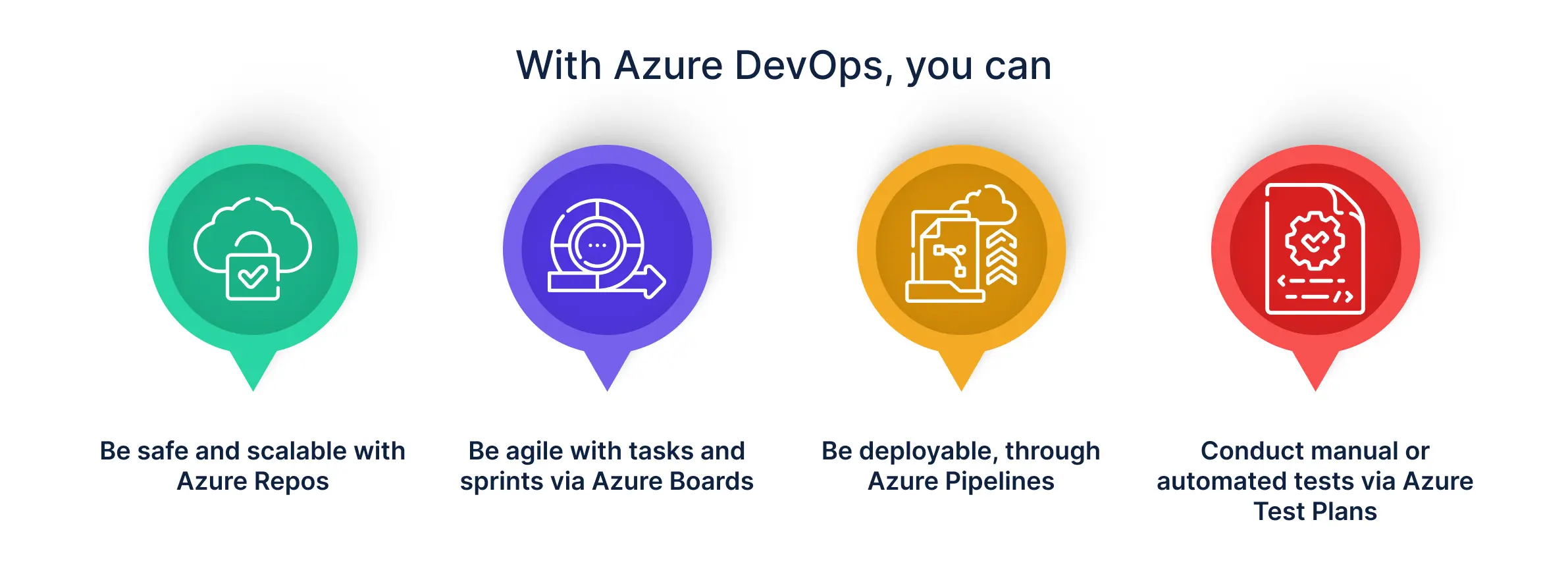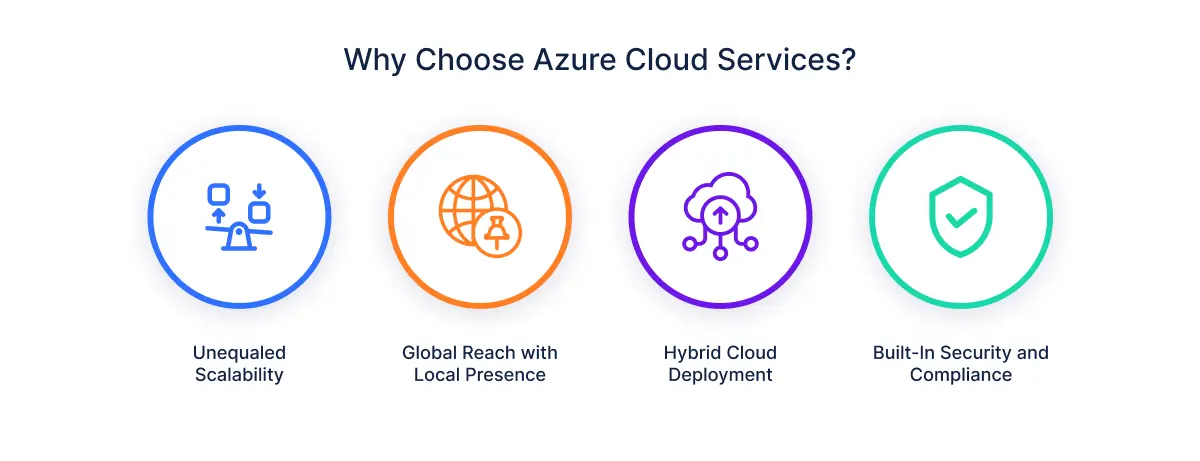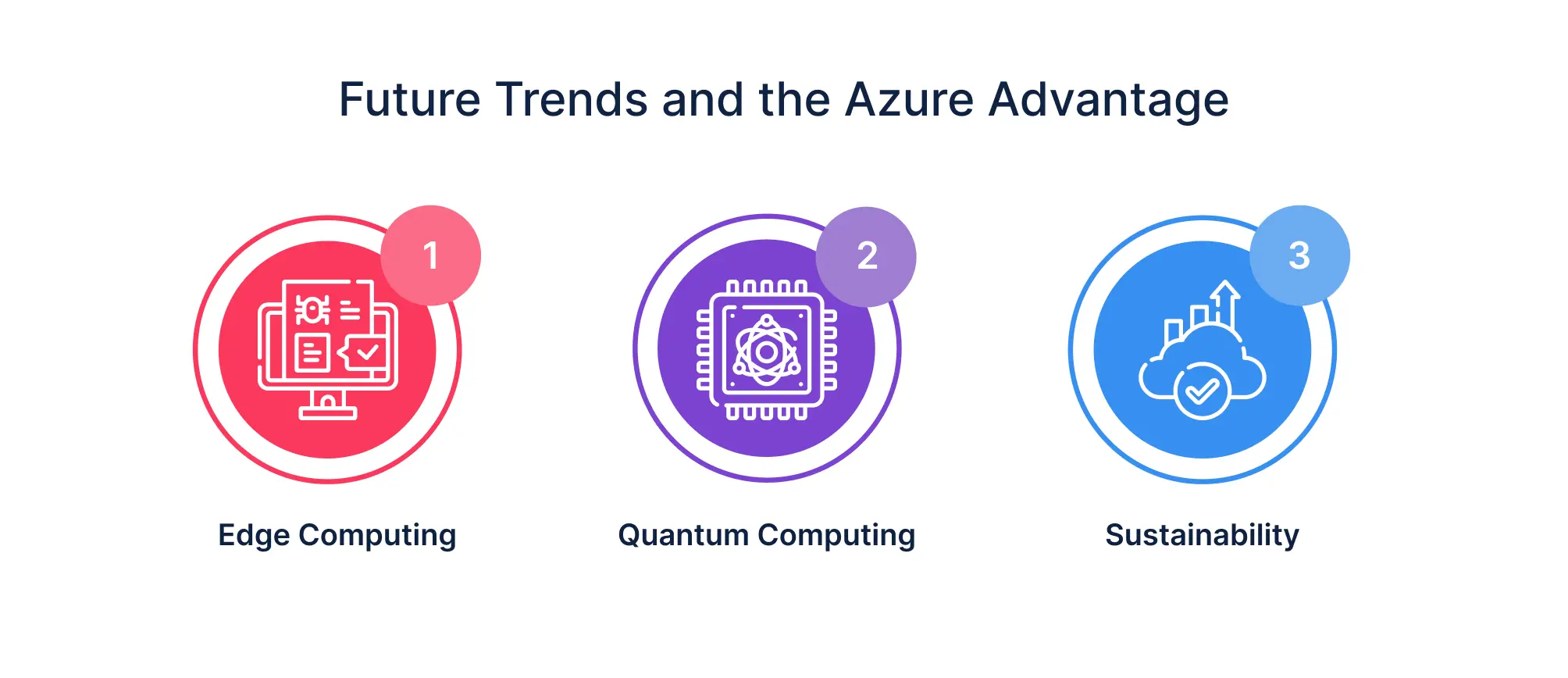Jul
Why Azure Cloud Services Are the Future of Scalable IT Solutions

In our connected world today, companies need IT systems that offer flexibility, protection, and room to grow. As tech keeps changing, old in-house setups can’t keep up. To stay in the game, more and more businesses are turning to Azure Cloud Services as the heart of their digital makeover plans. Azure Cloud Services gives you a set of strong tools that work well together, creating a platform ready for the future. This platform helps you build, run, and grow modern IT setups. But what makes it stand out in the busy world of cloud computing? Let’s take a look at how Azure Cloud Services are leading the way to IT solutions that can grow with your needs.
The Rise of Cloud Computing
The landscape of IT has changed dramatically due to cloud computing. Businesses can now store, access, and process data over the internet rather than relying on physical hardware. Scale increases the demand for all cloud-native solutions exponentially.
Azure Cloud Services provides a spectrum of solutions for organizations of all needs, from start-ups to global enterprises. Azure offers the flexibility of developing custom applications, managing data in databases of any size, or guaranteeing data compliance.
Regardless of need, Azure cloud service has a solution in a flexible infrastructure. Its ‘pay-as-you-go’ plan and global network of consistent data centers allows businesses to scale operations in an efficient manner. Microsoft provides a platform that has options for monitoring, automation and security to ensure their companies are resilient in a complex, ever-changing digital environment.
Why Choose Azure Cloud Services?
1. Unequaled Scalability
Scalability isn’t a luxury anymore—it’s a requirement for today’s businesses that want to stay nimble and responsive to shifts in the market. Azure Cloud Services is designed with scalability in mind, featuring both horizontal scaling (increasing the number of virtual machines to support higher loads) and vertical scaling (increasing resources on current machines). These upgrades can be made with little interruption to operations, allowing businesses to keep things running even during spikes in demand. Whether you are introducing a new app, growing into a new market, or dealing with seasonal traffic spikes, Azure enables effortless changes in computing capability, storage capacity, and network bandwidth.
2. Global Reach with Local Presence
One of the key strengths of Azure Cloud Services is its enormous global reach. Microsoft Azure covers over 60 regions and is operating in over 140 countries, placing it among the world’s most geographically distributed cloud platforms. The widespread reach ensures application deployment and data storage can be made close to their customer base, which enhances latency, speed, and performance considerably. In addition, Azure provides data residency and sovereignty solutions, enabling companies to maintain compliance with local laws and regulations while still enjoying worldwide connectivity.
3. Hybrid Cloud Deployment
Though complete cloud adoption is the aim for most organizations, the truth is that hybrid cloud deployment is still a viable and strategic option—particularly in the case of enterprises with legacy solutions, stringent regulatory requirements, or special operational demands. Azure Cloud Services supports hybrid deployment better than most providers through a rich set of tools and services designed for seamless integration. Azure Arc allows businesses to manage on-premises servers, multi-cloud environments, and edge devices through a single control plane. Azure Stack enables the deployment of Azure services within local data centers, offering consistent experiences regardless of location. Secure VPN Gateways and ExpressRoute connections further ensure smooth and secure communication between cloud and on-prem environments.
4. Built-In Security and Compliance
In the data-driven economy of today, IT leaders’ priorities include cybersecurity and compliance. Azure Cloud Services meets these priorities through a robust, multi-layered security model that secures data, applications, and infrastructure. It starts with physical security in Microsoft’s world-class data centers, which are protected by best-of-breed perimeter defence, monitoring, and biometric door controls. Digitally, Azure provides a toolkit featuring:
- Azure Security Center – A single, unified infrastructure security management solution that delivers sophisticated threat protection for hybrid cloud workloads.
- Network Security Groups (NSGs) – Utilized to manage inbound and outbound traffic to network interfaces and virtual machines for improvement in perimeter security.
- Azure Firewalls and Application Gateways – For intelligent threat detection as well as traffic inspection.
- Encryption – Azure provides encryption in transit and at rest using strong encryption protocols and customer-provided keys if necessary.
From a regulatory perspective, Azure supports a vast range of global and industry-compliant standards like ISO 27001, GDPR, HIPAA, FedRAMP, SOC 1/2/3, and so on. Microsoft provides comprehensive audit and compliance reports to ensure companies can remain transparent and trusted with stakeholders and regulatory organizations.
Windows Azure Cloud Service: The Foundation of Innovation
Windows Azure Cloud Service, a key part of Microsoft Azure, has changed how companies build, launch, and grow cloud-based apps. It gives a strong platform-as-a-service (PaaS) setup that hides the tricky parts of managing infrastructure letting dev teams put their energy into creating more value.
It offers:
- Web and worker roles to run apps that can grow and spread out, which lets businesses split front-end and back-end tasks to boost performance and make upkeep easier.
- Auto updates, load sharing, and health checks to keep things running, cut down on manual work, and reduce downtime.
- Teamwork with CI/CD pipelines through Azure DevOps Services, which makes it easy to push out code, control versions, and run auto tests throughout the whole dev process.
Windows Azure Cloud Service offers built-in support for keeping systems up and running, handling errors, and making deployment smooth. This creates a reliable and safe environment that’s perfect for big business apps. The service also works well with other Azure products, which makes it easier to grow your system and add new features as your company expands.
Seamless Azure Cloud Migration
For any organization, changing to the cloud is a significant transition – however, it doesn’t need to be complicated and disruptive. With Azure Cloud Services, you’ll find many Azure Cloud Migration tools to establish a pathway for each organization to migrate safely, securely, effectively, and affordably.
Highlights of Tools and Services Include:
- Azure Migrate– The hub for discovery, assessment, and migration of on-premises servers, databases and applications. This service will show dependencies, performance metrics, and readiness to migrate.
- Azure Database Migration Service – A robust toolset to migrate on-premise databases (SQL Server, MySQL, Oracle, etc.) to Azure with zero downtime, repeatable processes, and secure data within Azure.
- Real-time replication tools – Azure Site Recovery enables clients to migrate in real-time utilizing their existing hardware and continuing all workloads with minimal to no business impact.
Collectively, these tools create a comprehensive plan to securely and reliably migrate legacy systems, mission critical applications, and highly sensitive data to Azure Cloud Services. Through the insight gained from intelligent automation, businesses can input workloads, analyze cost estimates and develop a suitable migration strategy for each workload – it could be rehost, refactor, rearchitect, or even rebuild.
Azure DevOps Services: Powering Modern Development
In the world of digital, the demand for speed and agility is now paramount in delivering quality software. Azure DevOps Services is Microsoft’s all-in-one DevOps platform that has a complete range of tools to suit all areas of the software development lifecycle, from planning to deployment.

With Azure DevOps, you can:
- Be safe and scalable with Azure Repos – version control for both Git and Team Foundation Version Control (TFVC).
- Be agile with tasks and sprints via Azure Boards – a flexible work tracker that supports Kanban, Scrum, and custom workflows.
- Be deployable, through Azure Pipelines – CI/CD automation that can deploy code to multi-environment and/or multi-cloud.
- Conduct manual or automated tests via Azure Test Plans – complete QA with traceability and actionable feedback.
A fully integrated set of tools enables development, operations, and QA teams to better work together in real-time, eliminating bottlenecking and siloing. Utilizing continuous integration and continuous delivery (CI/CD) enables companies to drastically shorten their release cycles, and improve product stability. Azure DevOps Services is the right solution for any organization that wants to achieve a quicker time to market, and maintain tighter control of software quality and delivery.
Embracing Containerization with Azure Kubernetes Service (AKS)
As businesses move toward modern application development, containers have become the standard for building and deploying scalable, reliable software. Azure Kubernetes Service (AKS) is Microsoft’s managed Kubernetes offering, designed to streamline container orchestration while reducing operational overhead.
AKS Simplifies:
- Automated provisioning, scaling, and upgrades of Kubernetes clusters, removing the need for manual configurations.
- Integrated monitoring, security, and identity controls using Azure Monitor, Azure Defender, and Azure Active Directory.
- Multi-region deployments, allowing applications to run closer to users for enhanced performance and availability.
AKS is tailor-made for microservices architectures, where applications are broken into small, independently deployable services. It supports seamless integration with CI/CD pipelines, making it ideal for agile teams focused on rapid, iterative development.
By using Azure Kubernetes Service, businesses can modernize legacy systems, improve resource efficiency, and ensure resilient application performance in a multi-cloud or hybrid environment. It empowers teams to innovate faster while maintaining consistency, security, and scalability.
Cost Efficiency and Flexibility
One of the most compelling advantages of Azure Cloud Services is its cost-effective and flexible pricing model. With pay-as-you-go billing, businesses pay only for the resources they consume, making Azure suitable for both startups with limited budgets and large enterprises with complex IT needs.
Whether it’s spinning up virtual machines for temporary workloads or running 24/7 enterprise-grade applications, Azure offers flexible compute and storage options to match. Businesses can also take advantage of:
- Reserved instances, allowing companies to purchase unused compute capacity at reduced rates.
- Spot pricing, These content management systems offer flexible platforms for building dynamic websites with features like plugins, user roles, content scheduling, and easy backend editing.
- Azure cost management tools, which help track expenses, set spending thresholds, and forecast future usage to avoid unexpected charges.
This financial transparency and control make Azure an attractive choice for CIOs and IT managers aiming to maximize ROI while maintaining performance.
Supporting AI, Machine Learning, and Big Data
In today’s data-driven economy, success depends on an organization’s ability to extract insights and make intelligent decisions quickly. Azure Cloud Services provides a powerful ecosystem of tools and platforms to support artificial intelligence (AI), machine learning (ML), and big data analytics.
Key services include:
- Azure machine learning – A fully managed platform to build, train, and deploy ML models at scale.
- Azure synapse analytics – A unified data warehousing and analytics platform that processes massive amounts of structured and unstructured data.
- Power BI – An intuitive data visualization tool that connects with Azure services to turn raw data into interactive dashboards and reports.
These tools integrate seamlessly with the broader Azure ecosystem, enabling companies to automate processes, forecast trends, and make real-time, data-driven decisions. Whether it’s personalizing customer experiences or optimizing supply chains, Azure empowers businesses to unlock the full potential of their data.
Use Cases Across Industries
Azure Cloud Services isn’t limited to the tech industry. Its versatility and robust capabilities make it ideal for a wide range of sectors, helping businesses modernize operations, ensure compliance, and accelerate innovation.
Here are just a few examples:
- Healthcare: Securely manage electronic health records, enable remote patient monitoring via telemedicine, and use AI to assist in diagnostics.
- Finance: Detect fraud in real-time, run risk models, and meet strict regulatory requirements with built-in compliance and security tools.
- Retail: Use predictive analytics for inventory forecasting, personalize the customer experience, and streamline operations through connected supply chains.
- Manufacturing: Integrate IoT for smart factory automation, perform predictive maintenance, and gain insights from sensor data in real time.
These real-world applications demonstrate Azure’s ability to adapt to sector-specific challenges, making it a trusted cloud platform across global industries.
Future Trends and the Azure Advantage
The future of IT is rapidly evolving toward being cloud-native, data-driven, and security-centric. Azure Cloud Services is not just keeping pace—it’s leading the charge by aligning with emerging technologies and global priorities. Here’s how Azure is preparing businesses for the next wave of digital transformation:
Edge Computing:
With Azure IoT Edge, Azure enables data processing closer to the source—such as sensors, devices, or local servers—reducing latency and improving responsiveness. This is vital for industries like manufacturing, healthcare, and autonomous vehicles, where real-time decision-making is crucial.
Quantum Computing:
Microsoft is heavily investing in the future of computing through Azure Quantum, a cloud-based platform that provides access to quantum hardware and software tools. This initiative is aimed at solving complex problems in cryptography, material science, and optimization that classical computers struggle to handle.
Sustainability:
As environmental concerns become central to IT planning, Azure is committed to sustainability. Microsoft has pledged to power all Azure data centres with 100% renewable energy by 2025, helping businesses meet their green goals while reducing their carbon footprint.
By embracing innovation and environmental responsibility, Azure Cloud Services positions itself as the ideal platform for future-ready IT strategies. Whether it’s scaling with advanced compute power or aligning with global sustainability goals, Azure continues to set the standard for what’s next in enterprise cloud computing.
Final Thoughts
As organizations accelerate their digital transformation, the need for a reliable, secure, and scalable IT foundation becomes critical. Azure Cloud Services ticks all the boxes—offering flexibility, performance, global reach, and cost efficiency. From seamless Azure Cloud Migration to agile development with Azure DevOps Services, and robust hybrid solutions via Windows Azure Cloud Service, Microsoft Azure leads the charge into the future of IT. By leveraging powerful tools like Azure Kubernetes Service and AI-driven platforms, businesses can innovate faster, operate more efficiently, and scale without limits. Whether you’re a startup, a government agency, or a global enterprise, Azure offers a future-proof path to success.
Frequently Asked Questions
Azure offers elastic scalability, allowing businesses to increase or decrease computing power, storage, and resources on demand. This flexibility ensures organizations only pay for what they use, making it ideal for handling unpredictable workloads.
With Azure, companies can move away from expensive on-premises hardware and maintenance costs. Instead, they benefit from a pay-as-you-go model that optimizes IT spending while still providing enterprise-level performance.
Yes, Azure provides high availability with data centers across multiple regions worldwide. Its built-in disaster recovery and backup options ensure business continuity, even during outages or system failures.
Azure follows a multi-layered security approach with features like advanced threat detection, encryption, compliance certifications, and identity access management. This makes it a trusted platform for industries with strict data regulations.
Azure is designed for flexibility and supports hybrid deployments, allowing businesses to integrate on-premises infrastructure with the cloud. It also works seamlessly in multi-cloud environments, giving enterprises more control over their IT ecosystems.
Azure integrates advanced AI and machine learning services that help businesses automate tasks, analyze big data, and build intelligent applications. These tools empower organizations to innovate faster and improve customer experiences.
With data centers in over 60 regions, Azure helps companies expand operations globally without setting up physical infrastructure. This allows businesses to deliver fast, localized experiences to users anywhere in the world.
Absolutely. Azure’s pay-as-you-go model, flexible pricing, and scalability make it accessible to small and mid-sized businesses. They can start small with minimal investment and expand as their needs grow.
Azure provides integrated DevOps tools, CI/CD pipelines, and automation capabilities. These features allow developers to quickly build, test, and deploy applications, accelerating time-to-market and improving productivity.
Azure combines scalability, cost efficiency, security, global reach, and innovation through AI, IoT, and analytics. Its ability to adapt to evolving business needs positions it as a leading cloud platform for enterprises seeking sustainable IT growth.





